Classics 301B
April 1, 2025
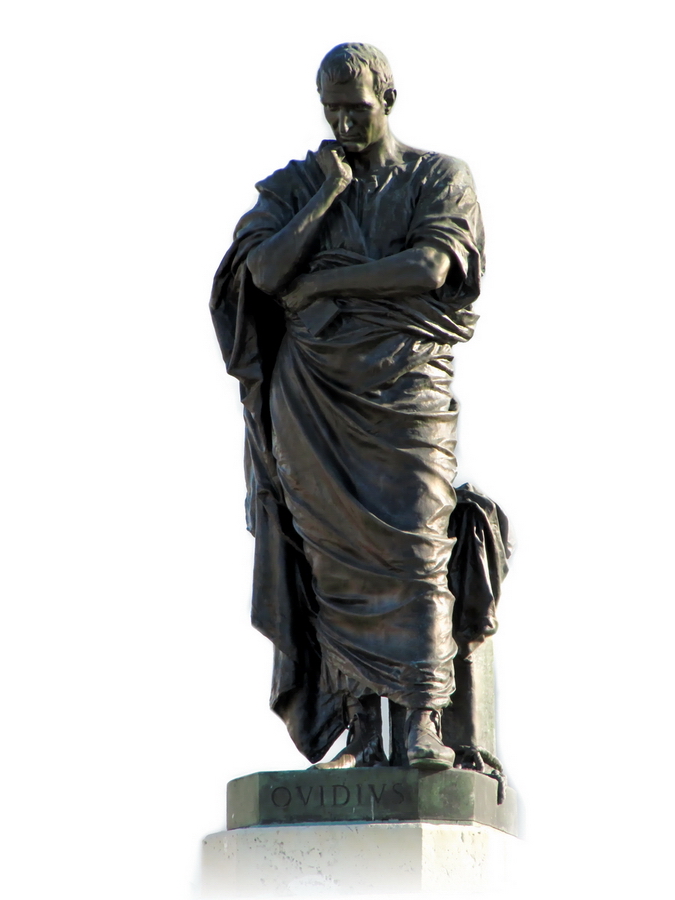
Ferrari, statue of Ovid (Constanța, Romania, 1887)
Study Guide for Exam #2 (Tuesday, April 8)

Publius Ovidius Naso (43 BCE-17 CE; late Augustan poetry removed from civil wars & settlement): Sulmo (Abruzzo, east of Rome), studies in Rome & Athens; abandons civil career ("How long must I go on hearing the same old cant: get a real job, Ovid . . . go to law school", 1.15.3ff.); joins circle of Messala; exiled to Tomis (Romania, 8 CE) by Augustus for carmen, "poem” (Ars Amatoria/Art of Love?) et error, “an indiscretion/mistake" (?); exile poetry includes Tristia (“My Sorrows”)
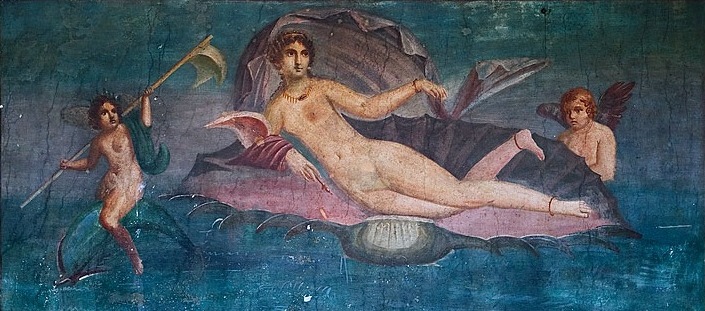
Venus Anadyomene ("rising up") (Pompeii, 1st century CE)
- Amores (“Loves”/“Love Affairs”): published in multiple editions after 20 BCE (our 3 books perhaps as late as 1 CE); virtuoso poet self-consciously scaling hierarchy of genres (elegy > epic = Metamorphoses, 8 CE), demonstrating mastery of poetic forms (vs. lovesick elegiac poet?)
Amores 2.18.5ff. (playful recusatio addressed to poet Macer)
While your magnum opus builds to the heights of wrathful Achilles
and you fit the sworn confederates with arms
you'll find me, Macer, cooling my heels in Venus' shadow
with Cupid calmly squelching my pretensions
to grandiosity.
I've tried telling Corinna to get lost;
she comes right back and sits down in my lap.
I've told her, "I'm ashamed"; she bursts into tears, and moans,
"are you ashamed of love? ashamed of me?" [Corinna = elegy]
Then she twines her arms around my neck and kisses me
until it's hopeless; I lose all control,
I'm vanquished utterly; I no longer have the slightest concern
for Arms and the Man; I want that woman's arms!
Not that I haven't tried other genres . . . [mentions successful tragedy, Art of Love, Heroides, "Heroines"]
- bold metapoetic farewell to elegy (sphragis poem of 3 books, Amores 3.15): "Mother of gentle Amores, find yourself another poet: /
my elegies have run their final race . . . [canonizes himself with Vergil (Mantua) and Catullus (Verona) as Italian poets] . . . Dionysus moves me now with his solemn thyrsus; / my horses' hooves must strike on new terrain. [lost Medea] / Farewell, tender elegies, and you my joyous Muse—my work / and fame will long outlast my little life" (3.15.1ff.)
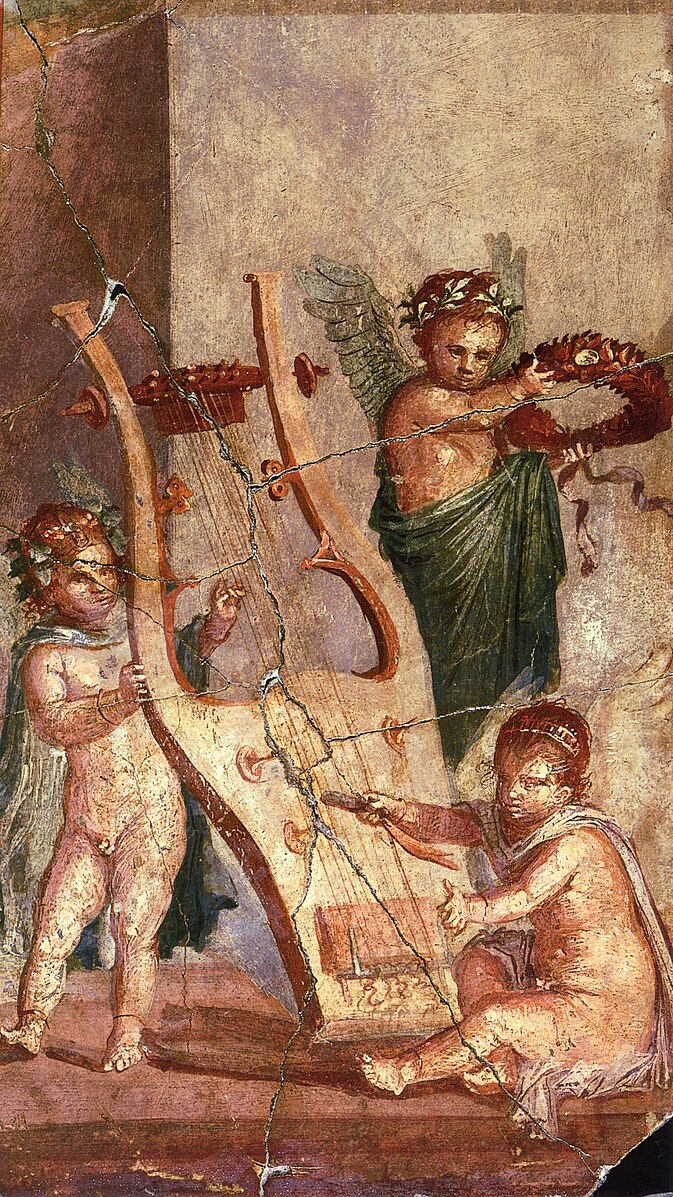
Cupids playing a lyre (Herculaneum, 1st century CE)
- Amores: Alexandrian learnedness & wit, elegiac poems with often humorous treatment of conventions, speaker's irreverence & self-defeating incompetence in love, ironic distance from emotions, meta-literariness; variety of nugatory or idiosyncratic (topical) pieces, e.g. 1.4 (dinner party instructions to married mistress), 1.14 (hair-dye disaster), 2.14 (abortion poem), 1.6 (emaciated lover's paraclausithyron to chained slave-doorkeeper – begging, bartering, threatening until he gives up in morning)
- mistress Corinna rarely mentioned (cf. Greek choral lyric poet, Boeotia); poet's love for Corinna not a matter of life & death
- Amores 1.1, programmatic opening of Amores: love poet not already in love, Ovid playfully negotiating poetic genre & genre hierarchy with Cupid (epic vs. elegy)
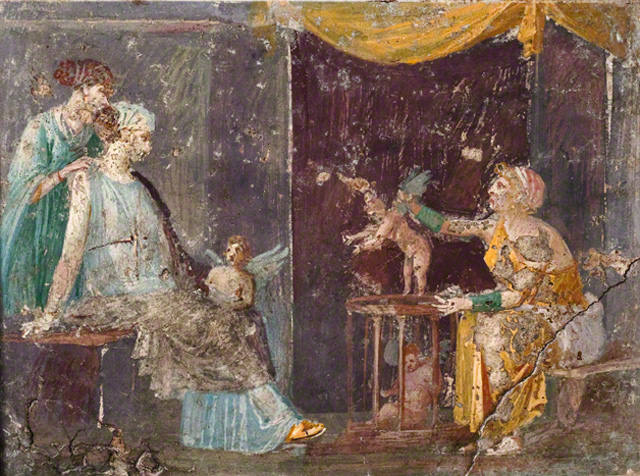 Woman selling Cupids (Villa di Arianna, Stabiae, 1st century BCE)
Woman selling Cupids (Villa di Arianna, Stabiae, 1st century BCE)
Weapons and war were my theme. I was ready to roll forth battle lines [first word arma]
in meter to match my subject matter.
Ranks of verses stood in strict formation—when Cupid laughed
(it’s said) and stole a foot of hexameter. [dactylic hexameter > pentameter of elegiac couplet]
'Barbarous boy, who gave you leave to meddle in the art of poetry?
It’s the Pierides, not you, we bards flock to.
What if you caught Venus trying on the breastplate of blond Minerva,
or blond Minerva fanning the flames of love? . . .
[examples of other gods venturing out of bounds]
. . . Don’t you see I haven’t the themes light verse is made of: no boy
or girl with her hair nicely done up.' [elegy]
So I complained. He just reached into his opened quiver
and found the arrow meant for me.
He stoutly gripped his bow and bent it back against his knee:
'Here’s something,' he said, 'to make you sing.'
O unhappy me! That boy really knew how to use a bow and arrow!
I’m on fire—Love’s taken charge of my heart.
Now let my verse swell with one line and fall back with the next.
Farewell war and iron-shod hexameters!
[Corinna not named until Amores 1.5]
[*Cf. Callimachus' Aetia prologue:
In fact the very first time I put the writing tablet
on my knees, Lykian Apollo said to me:
"[...] poet, nurture your sacrificial victim to be as fat as possible,
but your Muse, O good fellow, to be slender!
One more thing, I enjoin you this: the paths that wagons don’t drive on,
tread on those, don’t drive your chariot in the same tracks as the others,
don’t take the broad street, take instead unworn paths
even though you drive on a narrower road."]

Thorvaldsen, Cupid Triumphant (1898)
- Amores 1.2: playful parody of elegy's conceptual metaphors & tropes (servitium amoris, militia amoris) in imaginative triumphal song (Cupid's chariot pulled by Venus' doves!) after lover finally acknowledges he's in love (playfully subversive of Augustan values?)
Amores 1.2.19-40 (stricken lover surrenders to "General" Cupid)
Cupid, I acknowledge now that I’m your latest battle spoils.
You set the terms, I hold out my hands, defeated.
No need to start a war. I pray for an armistice and clemency;
there’s no fame in conquering an unarmed man.
Bind myrtle in your hair. Go bridle your mother’s sacred doves;
your stepdad Vulcan will custom build your car. [Vulcan, builder of epic instruments]
In it you’ll ride in glory. The Roman people will roar ‘io triumphe!’
as you expertly guide the harnessed birds.
Your captives, men and women in youth’s flower, will be paraded
in your magnificent triumphal procession.
And there I’ll be, my wound still fresh for all to see, your latest prize,
in unaccustomed chains, my heart your slave.
Good conscience, her hands bound behind her back, and Decency,
and all Love’s enemies will be paraded. [Mens Bona, Pudor among Cupid's POWs]
You terrify the world. The multitude lifts up its arms, salutes you,
and with a mighty voice will chant ‘io triumphe!’
Your faction’s stalwarts flock along beside you: the ranks
of Blandishment, Misstep, and Mania. [Blanditiae, Error, Furor in Cupid's army]
With soldiers like these you subjugate the human race and the gods;
without such reinforcements, you’d be exposed.
[final plea for Cupid's clementia, "take a lesson from Caesar, your kinsman, and his auspicious arms: / the hand that conquers shields the ones it vanquished"; cf. "grant the conquered clemency" (Aeneid 6.853)]
- Amores 1.4: comic/didactic persona of praeceptor amoris ("love doctor") at dinner party (versus fearful, jealous elegiac lover, mistress still not named)
Amores 1.4.13-40 (instructions for secret signs & gestures) READER Niles
First, find an excuse to come before him—I really don’t know
what good it will do—but do it anyway.
Look the part of dutiful wife when you follow him to the dining couch,
but rub against my foot as you pass by.
Watch me. I’ll communicate by nods, the look on my face:
decode my winks and secretly reply.
Who needs speech? What can’t I say with the arch of an eyebrow
or trace with a finger in air or wine?
When you find yourself thinking of our latest lovemaking,
touch your flushed cheek with your thumb.
If you’re brooding over some wrong you think I’ve done,
let me know by pinching your earlobe.
But darling, if I say or do anything that gives you pleasure,
encourage me by twiddling your ring.
When you’re praying that he will suffer his just deserts, touch
the table as a suppliant would an altar.
Be wise and make him swallow the drink he mixed for you; calmly ask
the slave to bring whatever you want.
When you’ve taken a sip and put down your glass, I’ll snatch it
and press my lips to the wet rim.
If he thinks to pass the hors d’oeuvres he’s sampled,
turn up your nose at what he tasted.
Push him away when he tries to embrace you; don’t rest
your head tenderly on that tough chest.
Keep his hands out of your dress; shield your inviting breasts;
make it clear there will be no kissing.
Kiss him once and you can forget this masquerade; I’ll shout
“she’s mine” and throw my arms around you. [foolish lover threatens to expose own adultery]
[feckless & defeated lover's final instruction to mistress (at home): "But whatever happens during the night, tell me the next day / that nothing happened, and make me believe it"]
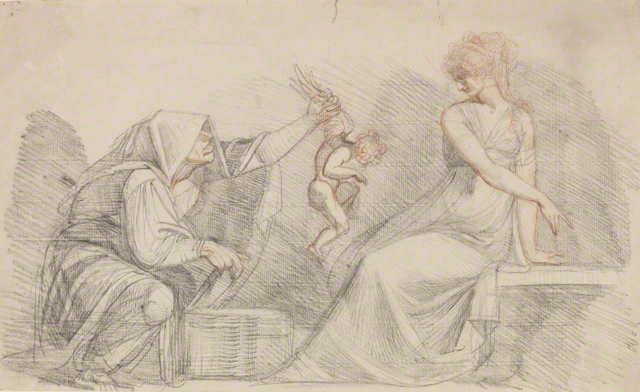
Fuseli, Cupid Seller (chalk drawing, 1775)







